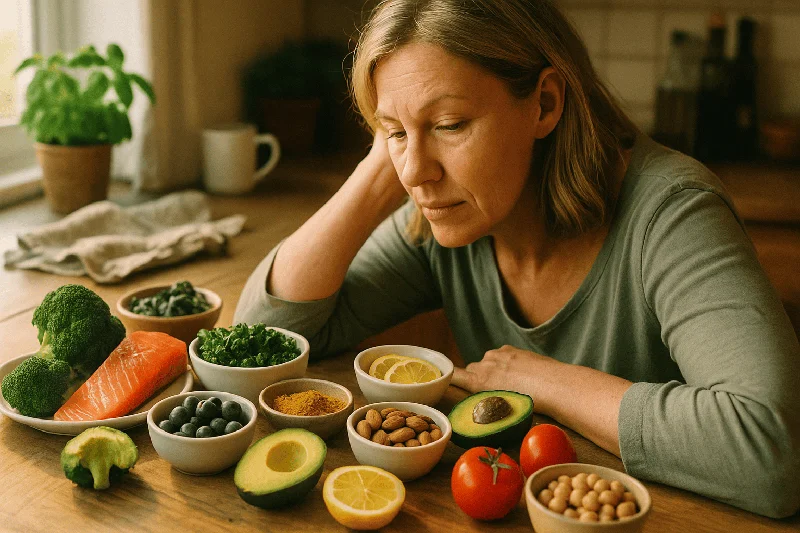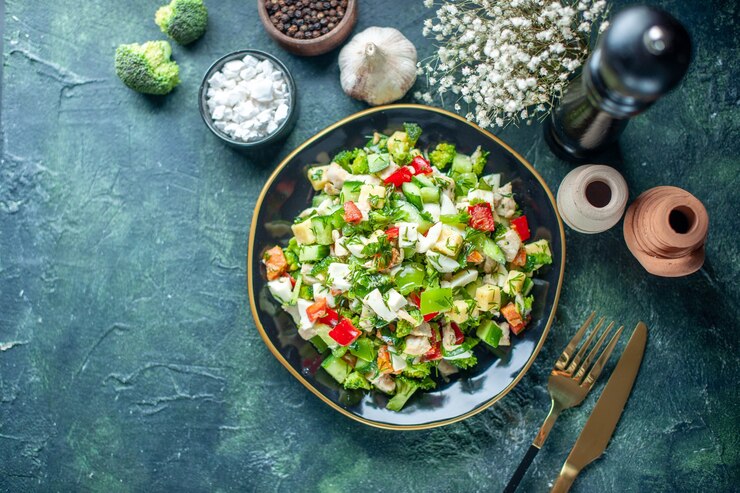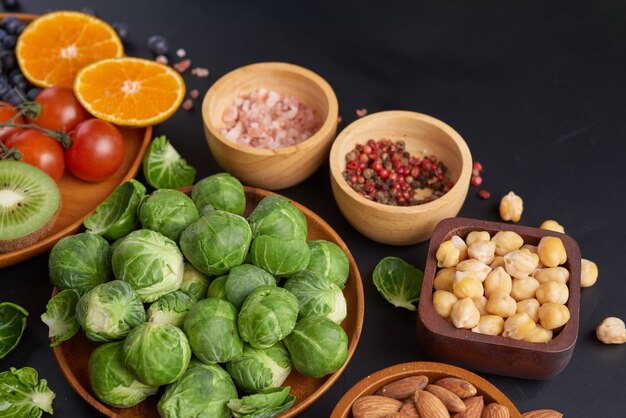Exploring the Anti-Inflammatory Diet

Key Takeaways Shortly
- The Anti-Inflammatory Diet is linked to Ayurveda, offering a holistic approach to naturally reduce inflammation.
- Incorporating inflammation-fighting foods can not only soothe inflammation but also enhance overall health.
- Anti-inflammatory herbs are crucial for supporting the body's healing processes and can be easily included in daily meals.
- Ayurvedic principles provide valuable insights for balancing bodily needs, complementing the Anti-Inflammatory Diet.
- Adapting the Anti-Inflammatory Diet to your lifestyle with small changes can lead to significant health improvements.
Ever wondered how what you eat can affect how you feel? That's where the Anti-Inflammatory Diet steps in. It's not just another diet trend. It's a way to help your body fight inflammation, which is linked to many health issues like arthritis and heart disease. This diet is all about choosing foods that can lower inflammation in your body.
In this article, we're diving into the world of the Anti-Inflammatory Diet. You'll discover how it aligns with ancient practices like Ayurveda, which have long promoted balance and wellness. We’ll explore inflammation-fighting foods that can make a difference in your health journey.
Why should you care? Because understanding this diet might just change the way you look at food. Instead of just eating for taste or convenience, you’ll learn to choose foods that can help your body stay in top shape. We’ll also touch on the power of anti-inflammatory herbs, which have been used for centuries to promote health.
So, if you're curious about how what you eat can help you feel better, stick around. This guide will give you the insights you need to get started on the path to a healthier, inflammation-free life.

Inflammation-Fighting Foods You Need
Eating the right foods can play a big role in reducing inflammation. For instance, a study published in the Journal of Nutrition in 2019 found that consuming more fruits and vegetables was linked to lower levels of inflammation. Think about adding colorful veggies like spinach, carrots, and broccoli to your meals.
Berries are another great choice. Blueberries, strawberries, and raspberries are packed with antioxidants. Antioxidants help your body fight off inflammation naturally. Including them in your breakfast or as a snack can make a real difference.
Nuts and seeds, such as almonds and flaxseeds, offer healthy fats that your body loves. Omega-3 fatty acids, found in these foods, are known for their inflammation-fighting properties. Including a handful in your daily diet can support your health.
How Anti-Inflammatory Herbs Help
Anti-inflammatory herbs are like nature's soothing balm. They help calm the body's inflammatory response, a process that can lead to various health issues if left unchecked. Turmeric, for instance, is a well-known herb in this category. It contains curcumin, a compound that gives turmeric its bright yellow hue and its inflammation-fighting power.
To illustrate, Ayurveda—a holistic healing system—frequently recommends turmeric for its ability to balance the body's energies and reduce inflammation. Another potent herb is ginger. Known for its spicy kick, ginger is often used to treat nausea, but it’s also a powerful anti-inflammatory agent. Research shows it can help reduce pain and swelling, particularly in conditions like arthritis.
"Let food be thy medicine and medicine be thy food."
- Hippocrates
This ancient wisdom underscores how herbs can be a natural ally in supporting health. Besides turmeric and ginger, other herbs like rosemary and garlic are also praised for their anti-inflammatory properties. They not only add flavor to dishes but can also contribute to overall well-being.
Incorporating these herbs into your daily routine can be simple and rewarding. You might sprinkle turmeric in your morning smoothie or add a dash of ginger to your tea. These small steps can make a big difference in how you feel, offering a natural way to manage inflammation and enhance health.
Incorporating Ayurvedic Principles
Ayurveda, an ancient Indian system of medicine, emphasizes balance in the body with the help of diet, lifestyle, and herbal remedies. Incorporating Ayurvedic principles into an Anti-Inflammatory Diet can enhance its benefits. One key element is the use of anti-inflammatory herbs like turmeric and ginger. These herbs are known for their powerful effects on reducing inflammation and promoting overall health.
Turmeric, for instance, contains curcumin, a compound celebrated for its anti-inflammatory properties. Studies suggest curcumin can rival some anti-inflammatory drugs, minus the side effects. This makes it a popular choice in both traditional and modern diets. Ginger, another Ayurvedic staple, may help with inflammation related to arthritis.
Eating according to your dosha, or body type, is another Ayurvedic principle. It suggests that different body types react differently to foods. For example, a Pitta type might benefit from cooling foods and spices, while a Kapha type might thrive on lighter, spicier meals.
The integration of these principles can create a personalized approach to fighting inflammation. This method not only looks at the symptoms but dives into the root cause, aiming for long-term balance and health. Such an approach can make an Anti-Inflammatory Diet more effective, aligning with individual needs and preferences.
Making the Diet Work for You
Wrapping up our exploration of the Anti-Inflammatory Diet and Ayurveda, it's clear this approach to eating isn't just a fad. It's a lifestyle change that can benefit many. Incorporating inflammation-fighting foods and anti-inflammatory herbs into your daily meals can reduce discomfort and promote overall well-being. Ayurveda, with its ancient wisdom, offers unique insights into balancing your diet to suit individual needs.
If you're ready to make this diet work, start small. Try adding some turmeric or ginger to your meals. Explore different fruits and vegetables that are known for their anti-inflammatory properties. Listen to your body's reactions and adjust accordingly. This is about finding what best fits your lifestyle and health goals.
Engage with this journey by sharing your experiences. Leave a comment below or share this article with friends who might find it helpful. If you're curious to learn more, explore related content that dives deeper into this fascinating subject. Let this be the first step toward a healthier, more balanced life.
FAQ For Anti-Inflammatory Diet
What is an Anti-Inflammatory Diet?
An Anti-Inflammatory Diet focuses on consuming foods that reduce inflammation in the body. Rooted in Ayurvedic principles, this holistic approach emphasizes balance and natural healing, which is why it's gaining popularity among those looking to soothe inflammation naturally.
Which foods are considered inflammation-fighting?
Inflammation-fighting foods include fruits like berries, vegetables such as leafy greens and broccoli, nuts, fatty fish like salmon, and whole grains. These foods are rich in antioxidants and essential nutrients that help reduce inflammation and promote overall health.
How do anti-inflammatory herbs support the body?
Anti-inflammatory herbs like turmeric, ginger, and garlic contain compounds that can reduce inflammation and support the body's healing processes. These herbs can be easily incorporated into meals to enhance flavor while providing health benefits.
How can Ayurvedic principles be integrated into the diet?
Ayurvedic principles can be integrated by focusing on whole, natural foods that suit your unique body constitution or 'dosha'. This includes eating seasonally, mindfully, and incorporating a variety of tastes in each meal to balance the body's needs.
Can the Anti-Inflammatory Diet be adapted to different lifestyles?
Yes, the Anti-Inflammatory Diet is flexible and can be adapted to various lifestyles. By making small, manageable changes, such as gradually incorporating more anti-inflammatory foods and herbs into your meals, you can enjoy significant health benefits without drastic changes.
What are some practical tips for starting this diet?
Start by gradually adding more fruits, vegetables, and whole grains to your diet. Use herbs and spices like turmeric and ginger in your cooking. Pay attention to how foods make you feel and adjust your intake accordingly. Planning meals ahead can also help you stick to the diet.
Are there any potential challenges with the Anti-Inflammatory Diet?
Some people may find it challenging to eliminate processed foods and sugar. However, by focusing on what you can eat rather than what you can't, and experimenting with new recipes, you can overcome these challenges and enjoy the diet's benefits.
Got any more questions?
Ask Ayurvedic doctor a question and get a consultation online on the problem of your concern in a free or paid mode.
More than 2,000 experienced doctors work and wait for your questions on our site and help users to solve their health problems every day.


